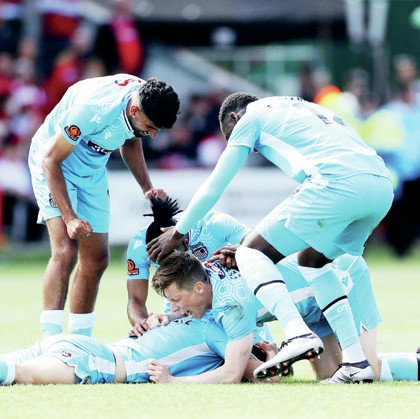Chris DUNLAVY
A FRESH TAKE ON FOOTBALL



Premier League Manchester City’s 1-1 draw with Real Madrid at the Bernabeu was intriguing, but never exciting. First legs rarely are. Like the opening round of a boxing match, there are jabs and feints and the odd stiff right to raise a cheer.
Mainly, though, the objective is to probe for weakness, gauge an opponent’s power and – above all – avoid a sucker punch.
But where’s the fun in that? Supporters want a slugfest, not a game of chess. Blood, thunder, agony and ecstasy.
In Europe, first legs are a necessary evil. Home advantage is just too important. But in domestic play-offs they are worse than pointless, serving to cheat the paying public of an exciting spectacle and the higher-placed side of a meaningful advantage.
It’s why the Non-League pyramid sets the standard when it comes to play-offs, and why the EFL should ditch their unfair and outdated two-legged format.
Notts County’s 3-2 win over Boreham Wood in the National League semi-finals had everything. An underdog threatening an upset. A 97th-minute equaliser. An extra-time winner with the last, spectacular kick of the game.
In the other semi, Bromley levelled in the ninth minute of stoppage time before Liam Mandeville’s extra-time strike sent Chesterfield to Wembley.
“I’ve never been involved in a more extraordinary game of football,” said Chesterfield goalkeeper Ross Fitzsimons. “It was nail-biting from the first minute to the last.”
Much the same could be said of Grimsby’s 5-4 victory over Wrexham at the same stage last season, or the 2020-21 Eliminator that saw County snatch a 90th-minute winner against Chesterfield.
It is difficult to imagine anything so extraordinary or nail-biting occurring over two legs. Psychologically, having just 90 minutes – or 120 – to get the job done imbues players with a different mindset. They have nothing to lose in the first leg and
nothing to protect or recover in the second. It’s a shoot-out, win or bust, the sort of game every fan wants to see.
Entertainment aside, the bigger issue is fairness. In finishing second to Wrexham, Notts County collected 107 points – one of the highest totals ever recorded in English football – and 35 more than sixth-placed Boreham Wood. This was acknowledged by the fact that they received a bye to the semi-finals and were granted home advantage in a one-legged tie.
Would the Magpies have mustered the energy for the 97th-minute raid that yielded Aden Baldwin’s last-gasp leveller without the encouragement of a partisan 20,000 crowd? We don’t know for certain, but it can’t hurt.
Now consider Luton Town. The Hatters finished third in the Championship this season, 11 points above semi-final opponents Sunderland. Their reward was a first-leg trip to the Stadium of Light, to face a side roared on by 50,000 fanatical supporters.
At the time of writing, the game hadn’t kicked off. But regardless of yesterday’s result, it was a situation that had the potential to leave Luton in the stink before they’d even enjoyed the supposed advantage of playing the second leg at Kenilworth Road.
“It’s a faulty system in the Football League,” said former Weymouth boss Steve Claridge, a man who has experience – good and bad – of both formats. “They’re not right. They’re not fair. If you finish 20 points clear of someone in the league, how can that just be put to one side and all of a sudden you start again? They’re about making money, not about giving the best team a genuine advantage.”
He’s right, of course. Twolegged games exist to make money for Sky, to satisfy sponsors and to plug gaps in budgets. Fair enough.
But at a time when the EFL has just agreed a bumper new TV contract and secured a pledge from broadcasters to act in the interests of supporters, it would be sensible to reflect on how their end of season offering could be improved.
Copying the example set by the National League would not be a bad place to start.





















